CREATE’s research showcases bring industry and community partners — leaders working and living in the disability and accessibility space — together with faculty and student researchers.
Spring 2025 Research Showcase
The closing event for CREATE’s Community Day 2025, this research showcase was co-sponsored by HuskyADAPT. Student teams presented 30 projects, covering a wide range of research. Undergraduate and graduate students from at least eight majors/programs and all three UW campuses shared their projects.
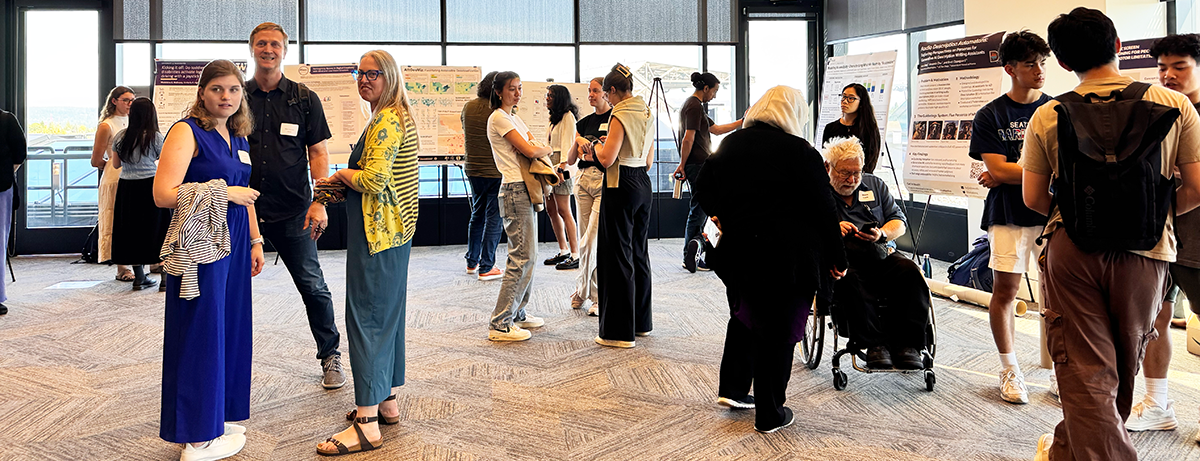
Accessibility from Below
Stacy Hsueh, Danielle Van Dusen, Anat Caspi, Jennifer Mankoff
An ethnographic study on how low-income and racially diverse disabled families navigate government services to access the assistive technologies they need. Through extended fieldwork at a Seattle nonprofit, we uncovered community-based strategies of care, resistance, and improvisation that families use to reclaim agency. These strategies offer practical insights for shaping community-driven accessibility research.
Accessible Digital Content Creation by Blind and Low Vision Individuals
Lotus Zhang, Gina Clepper, Zhuohao (Jerry) Zhang, Franklin Mingzhe Li, Simon Sun, Yu-Yun Tseng, Inan Xu, Abigale Stangl, Tanusree Sharma, Danna Gurari, Yang Wang, Patrick Carrington, Jacob O. Wobbrock, Leah Findlater
Application of user-centered methods, accessible design principles, and emerging technologies to support creative needs of blind and low-vision individuals to improve the accessibility of visually intensive tasks – crucial yet inaccessible components in digital content creation.
Learn more: Accessible Digital Content poster (PDF) | Accessible Digital Content slideshow (PPT)
Accessible Eyedropper: Co-Designing Eyedrop Dispensing Aids for People with Motor and Visual Disabilities
Jerry Cao, Ruiqing Wang, Yuecheng Peng, Sam Wong, Jennifer Mankoff, Shwetak Patel
Using eyedrops can be challenging. Blind/Low vision users might struggle to find the right bottle and aim it correctly. People with limited mobility may find it hard to tilt their head, squeeze the bottle, or keep their hands steady. Previous attempts to help have created new problems. We are studying these challenges by working with people who have trouble using eyedrops to find ways to improve eyedroppers and make them easier to use.
Accessible Guide Dog Backpack
Sanmathi Prabakar, Darby Moore, Chelsea Hom, Justis Peppin, Samara Chacko, and Toko Kameda
Our research involves designing a practical, inclusive, and user-friendly backpack that addresses the unique needs of guide dog users. We have worked to create a backpack that is well suited for everyday activities including transportation and carrying additional items.
AltGeoViz
Chu Li, Rock Yuren Pang, Ather Sharif, Arnavi Chheda-Kothary, Jeffrey Heer, Jon E. Froehlich
Geovisualizations are powerful tools for exploratory spatial analysis, enabling sighted users to discern patterns, trends, and relationships within geographic data. However, these visual tools have remained largely inaccessible to screen-reader users. We introduce AltGeoViz, a new interactive geovisualization approach that dynamically generates alt-text descriptions based on the user’s current map view, providing voiceover summaries of spatial patterns and descriptive statistics.
Learn more: AltGeoViz poster (PDF)
Arboretum: An experimental system for creating, transforming, and rendering accessible data structure representations
Ritesh Kanchi, Miya Natsuhara, Matt Wang
An experimental system for creating, transforming, and rendering accessible representations of data structures. It generates consistent semantic context across formats and structures, providing a foundation for future extensibility. Designed with both educators and students in mind, Arboretum emphasizes flexibility and accessibility throughout various workflows.
Learn more: Arboretum poster (PPT) | Arboretum poster (PDF)
ArtInsight: Enabling AI-Powered Artwork Engagement for Mixed Visual-Ability Families
Arnavi Chheda-Kothary, Ritesh Kanchi, Chris Sanders, Kevin Xiao, Aditya Sengupta, Melanie Kneitmix, Jacob O. Wobbrock, Jon E. Froehlich
A novel AI-powered system to facilitate deeper engagement with child-created artwork in mixed visual-ability families. ArtInsight leverages large language models (LLMs) to craft a respectful and thorough initial description of a child’s artwork and provides: creative AI-generated descriptions for a vivid overview, audio recording of the child’s description of their artwork, and AI-generated questions to facilitate discussion between blind or low-vision (BLV) family members and their sighted children.
Audio Description Automatons: Exploring Perspectives on Personas for Generative AI Description Writing Assistants
Lucy Jiang, Amanda Zhu, Brett Oppegaard
Audio description (AD) is typically crafted by experts. To support novice describers in writing high quality descriptions, we designed and developed a GenAI-powered online tool, “Guidedogs,” featuring five dogs with unique names, images, and voices that provided immediate and varied feedback on draft descriptions. Through this work, we contribute preliminary insights on generative AI assistant personas in an accessibility context and share design considerations to guide future work.
Learn more: AD Automatons poster (PDF) | AD Automatons CHI poster content (Google doc)
CardMate
Ananya Bhat, Kaila Bulfin, Anika Yechuri, Nithya Guduri, Spriha Sahni, Aida Khalaf, Mark Fernandez
CardMate is an assistive cardholder designed to help individuals with cognitive or motor disabilities securely store and easily access essential cards for tap, swipe, and insert transactions. By enabling one-corner card holding and intuitive access, CardMate reduces the need for fine motor skills and promotes greater independence in daily activities like transportation, payments, and building entry.
Design and Deployment of a Sensor-Based System for Assessing Powered Mobility Usage in Young Children with Disabilities in Clinical Settings
Mia Onodera, Kim Ingraham
Powered mobility technology fosters exploration, social engagement, and cognitive growth for young children with disabilities. Early access to these devices is critical, yet many children lack access during key developmental stages. In this study, we design a clinician-facing interface and develop a data-driven algorithm to assess powered mobility learning phases, to support early intervention during critical stages of development.
Learn more: Sensor-Based Assessment System poster (PDF)
Designing Trustworthy Cues in AI Embedded Health Portals for People Living with Dementia
Jazette Johnson
An exploration of how to design features within AI-embedded systems patient health portals that promote trust, confidence, clarity, and independence for adult participants and participants with cognitive disabilities.
Exploring How People with Motor Limitations Position Interactive Screens
Maya Cakmak, Tamanna Motahar, Vaishnavi Vidyasagar, Denby Frank
People with upper body motor limitations have difficulty holding portable screen-based devices, such as smartphones and tablets, and interacting with their screens through assistive technologies such as eye trackers or switches. Often, a caregiver needs to reposition the screen based on the needs and preferences of the user. We envision a robotic screen positioning system (likely wheelchair mounted) that can be directly controlled by the user and adjusted to the user’s context-dependent preferences.
Learn more: Screen Positioning poster (PDF)
Generative AI Design Tools
Kate Glazko, Czarin Isabelle Dela Cruz, Emily Chi, Gordon Huang, Maahnum Zaheer, Madhumitha Gandhi, Tashfia Sharmin, Jennifer Mankoff, Adriana Schulz
Consumer-grade fabrication tools, like 3D printers and laser cutters, are widely available. But designing useful, accessible items is difficult because the tools are complicated to learn. Our project is a system that coordinates multiple fabrication-specific agents (automated systems) to generate custom, constrained design tools that integrate diverse domain knowledge.
H.A.T. – A Camera-Based Finger Range-of-Motion Hand Assessment Tool to Enhance Therapy Practices
Yuka Fan, Sasha Portnova, Adria Robert Gonzalez, Emily Boeschoten
A visual-based digital flexibility assessment tool to enhance manual treatment techniques.
Learn more: H.A.T. project website | H.A.T. paper
How Does Clinical Presentation Impact Gameplay in Early Intervention?
Alisha Bose, Mia E. Hoffman, Kate Bokowy, Riley Bernas, Heather A. Feldner, Katherine M. Steele
Play is important for all children, but many toys aren’t accessible to those with physical disabilities. We created the Switch Kit to make play more inclusive by offering a low-cost, customizable set of accessible tools and games. Our research with early intervention providers showed that children’s needs affect how they interact with the kit, highlighting the importance of designing for different abilities.
Learn more: DS Play Mobility Aids poster (PDF) | DS Play Mobility Aids flyer (PDF) | Hoffman project web page
New Heights – Height Adjustable Walker
Sam Hui, TJ Morrow, Katina Nguyen, Advaii Srivastava, Amelie Bosnjak, Gabriel Calva
Our team has adapted a walker to fit the needs of a paralysis clinic in the area. The walker is height adjustable, and has padding for patients to practice standing with.
Learn more: Height Adjustable Walker poster (PDF)
Interaction Design of a Robotic Screen Positioning System for People with Motor Limitations
Tamanna Motahar, Alvin Le, Shreya Pandey, Kenneth Ton, John Lu
We are designing a low-cost robotic arm for the task of positioning a mobile phone for people with motor limitations.
Learn more: Robotic Screen Positioning System poster (PDF)
iOSPointMapper: Real-time Pedestrian and Accessibility Mapping with Mobile AI
Himanshu Naidu, Ricky Yuxiang Zhang, Sachin Mehta, Anat Caspi
An iOS app that helps in sidewalk and accessibility mapping by translating mobile camera images to standardized pedestrian path data in realtime. iOSPointMapper uses a device’s camera and LiDAR sensor to record the surrounding environment, which is then used to identify points that either facilitate or hinder accessibility for individuals with disabilities. Users can quickly validate the inferred map data before it is transmitted to an open data-sharing platform for sidewalk mapping.
Learn more: iOSPointMapper Poster (PDF)
Kicking it off: Do toddlers with disabilities activate leg muscles when driving with a joystick?
Madeleine E McCreary, Kimberly A. Ingraham, Heather A. Felder, Katherine M. Steele
Powered mobility devices let children with disabilities move around on their own. We studied leg muscle activation and patterns of activation in thirteen children with disabilities to inform interventions and to support play, development, and inclusion.
Learn more: Kicking it off poster (PDF)
Low-Cost Accessible Switch System
Laura Oliveira, Katherine Escoto Licona, Katelyn Doan, Catherine Darma, Catherine Ton, Omar Ahmad
A website that provides open source information about accessible switches. The website accounts for different prices budgets and needs by having multiple different switch types and ways to acquire them. This includes direct purchase links, to DIY tutorials from different creators, with various expertise levels, along with our recreations of them.
Learn more: Accessible Switches poster (PPT) | Accessible Switches web page | Accessible Swtiches GitHub repository
Mobility aids to support independent play for young children with Down Syndrome
Mia E. Hoffman, Spencer Hensley, Katie Belen Leija, Shariphine Agoalikum, Aislinn Knight, Aly Clarke, Heather A. Feldner, Katherine M. Steele
Children with Down Syndrome often experience motor delays compared to their peers. Mobility aids can help children move around independently and at a similar pace to their peers. This research focuses on evaluating the initial interactions of children with Down Syndrome with two specific mobility aids: the Permobil Explorer Mini powered wheelchair and the PUMA partial bodyweight support system.
Learn more: Mobility Aids poster (PDF) | Mobility Aids flyer (PDF) | Mobility Aids project website
Modeling Accessibility: Characterizing What We Mean by “Accessible”
Kelly Avery Mack, Jesse J. Martinez, Aaleyah Lewis, Jennifer Mankoff, James Fogarty, Leah Findlater, Heather D. Evans, Cynthia Bennett, Emma J. McDonnell
Accessibility research’s broad mandate — to use technology to make the world more accessible to disabled people — lacks a clear characterization of what “accessibility” is, who it’s for. Grounded in the lived experiences of a diverse group of 25 disabled people, we developed a process for modeling accessibility. We studied individuals’ assessments of inaccess, types of barriers, technology tools and skills, contextual factors, and how they weigh available options.
Learn more: Modeling Accessibility poster (PPT) | Modeling Accessibility poster (PDF)
New Heights – Height Adjustable Walker
Sam Hui, TJ Morrow, Katina Nguyen, Advaii Srivastava, Amelie Bosnjak, Gabriel Calva
Our team has adapted a walker to fit the needs of users at a local paralysis clinic. The walker is height-adjustable, and has padding for patients to practice standing.
SmartPath: A Modular System for GTFS-Pathways Mapping and Robotic Validation
Harshavardhan Reddy Gajarla, Dr. Anat Caspi, The Taskar Center for Accessible Technology
Our research focuses on developing a modular system for mapping and validating transit station pathways using the GTFS-Pathways schema. We combine an iOS-based mobile application for on-site data collection with a TurtleBot-based system for immediate verification and validation. This decoupled architecture enables flexible deployment, allowing transit agencies to use the mobile application independently or alongside robotic validation for improved accuracy and accessibility compliance.
spectrAble
Trisha Pawar, Neelesh Azad
SpectrAble is an innovative digital platform revolutionizing at-home care for children with Autism Spectrum Disorder (ASD), addressing the critical gap between clinical interventions and daily life support. Our mission is to provide comprehensive, personalized care that extends far beyond traditional therapy sessions.
Learn more: spectrAble poster (PDF)
Switch-Accessible Tablet App: Empowering Inclusive Play and Learning
James Tran, Mishti Dhawan, Arshita Misra, Helen Liu, Sneha Birru, Ella Cao
This project addresses the lack of accessible and engaging tools for children with disabilities, focusing on how to provide inclusive play opportunities to develop motor and cognitive skills. Through collaboration with educators and occupational therapists, the designed solution is a switch-accessible tablet app that includes various games, targeting key learning goals such as cause-and-effect, critical thinking, discovery, and creativity.
Learn more: Switch-Accessible Tablet App poster (PDF)
Toward Language Justice: Exploring Multilingual Captioning for Accessibility
Aashaka Desai, Rahaf Alharbi, Stacy Hsueh, Richard E. Ladner, Jennifer Mankoff
Explores the needs of people who are multilingual (i.e., understand or express themselves in more than one language) and who use captions for accessibility (e.g., d/Deaf and hard-of-hearing, neurodivergent, other disabled individuals) in different language contexts.
Wheels for Wonder
Johren Carpenter, Jorryn Decker Clement, Rowan Newell, Darius Khaleghi, Saadgi Garg, Rutvi Pota
Children with severe cerebral palsy need a lightweight, collapsible, rolling chair that allows them to achieve greater independence and easily connect with loved ones and other children their age. This design prioritizes both comfort and functionality, including neck support, safety features like locking wheels, and practical accessories. Ultimately, this device supports inclusion, independence, and meaningful interactions, supporting the child’s physical therapy goals while easing the caregiving burden.
Learn more: Wheels for Wonder poster (PDF)
Photos from the 2025 Research Showcase
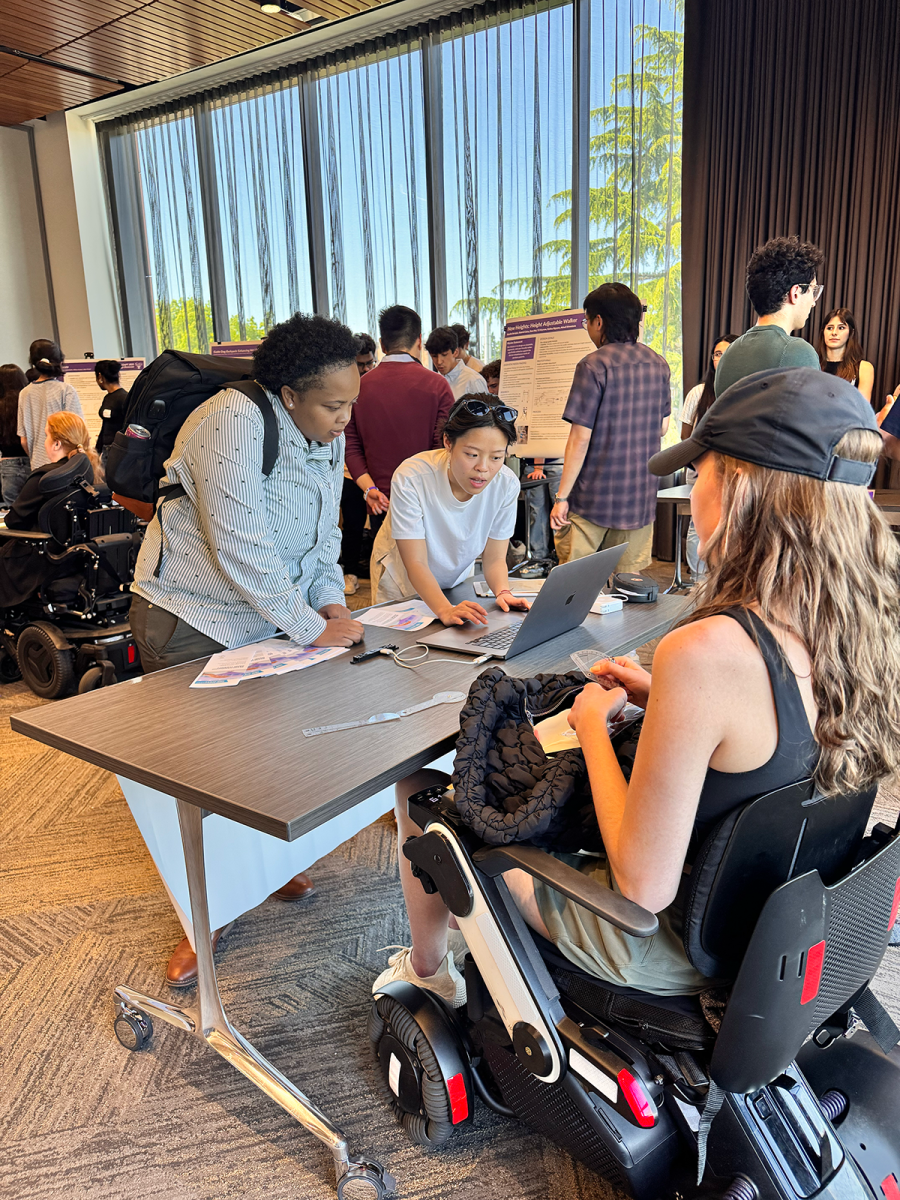
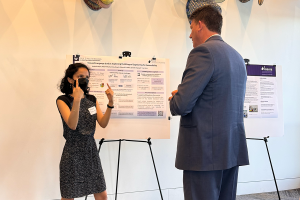
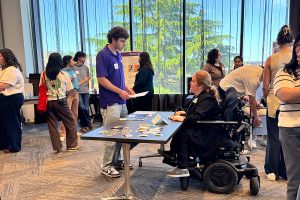
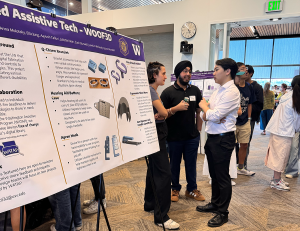
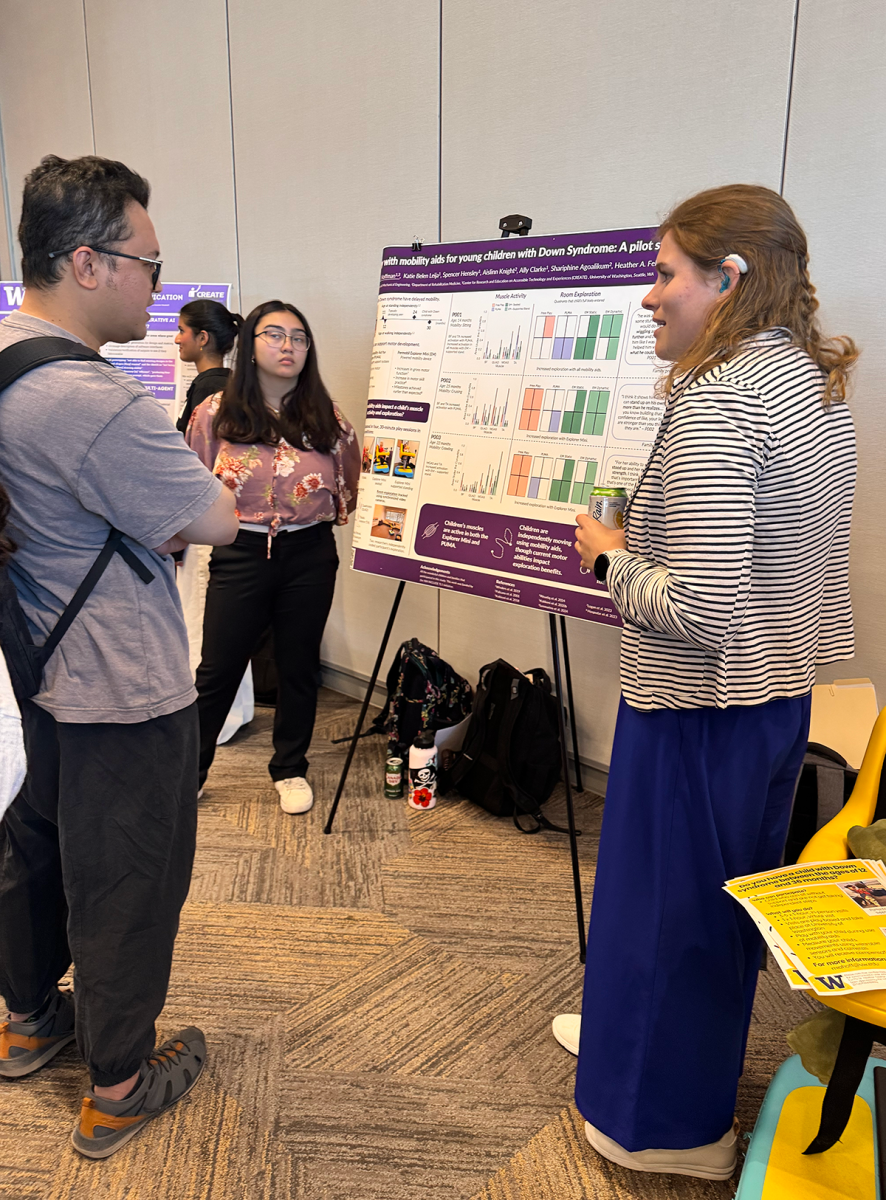
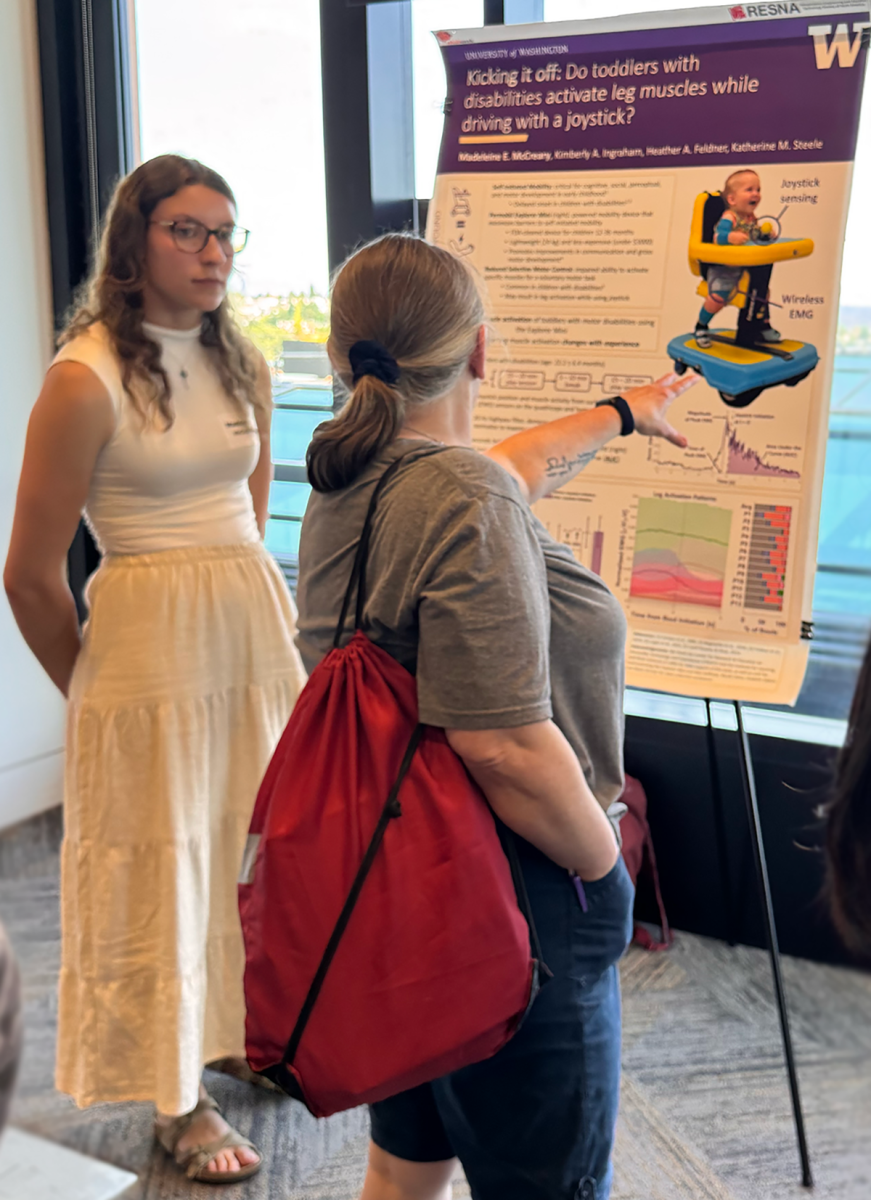
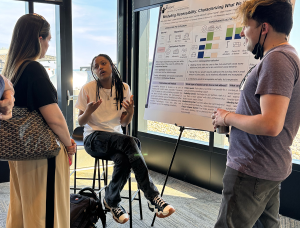
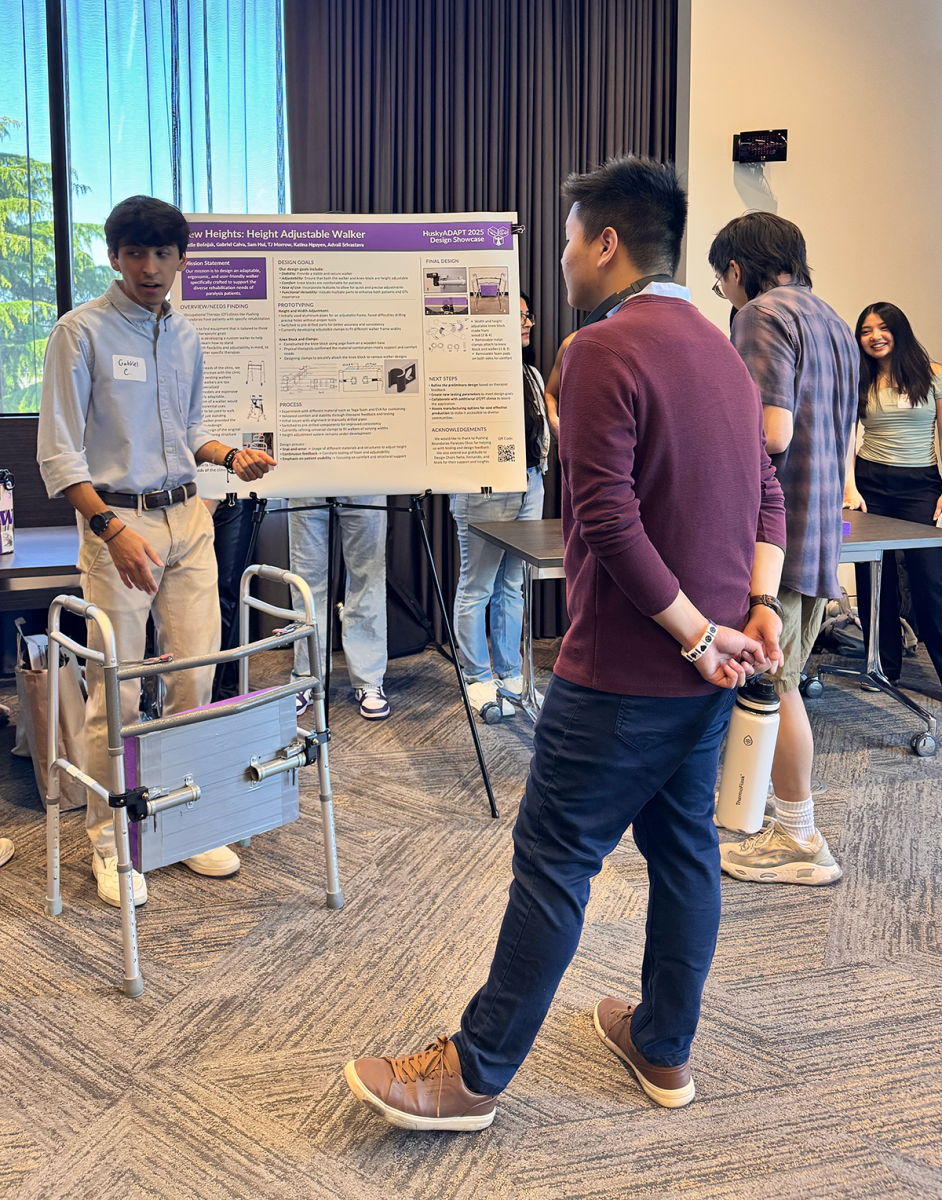
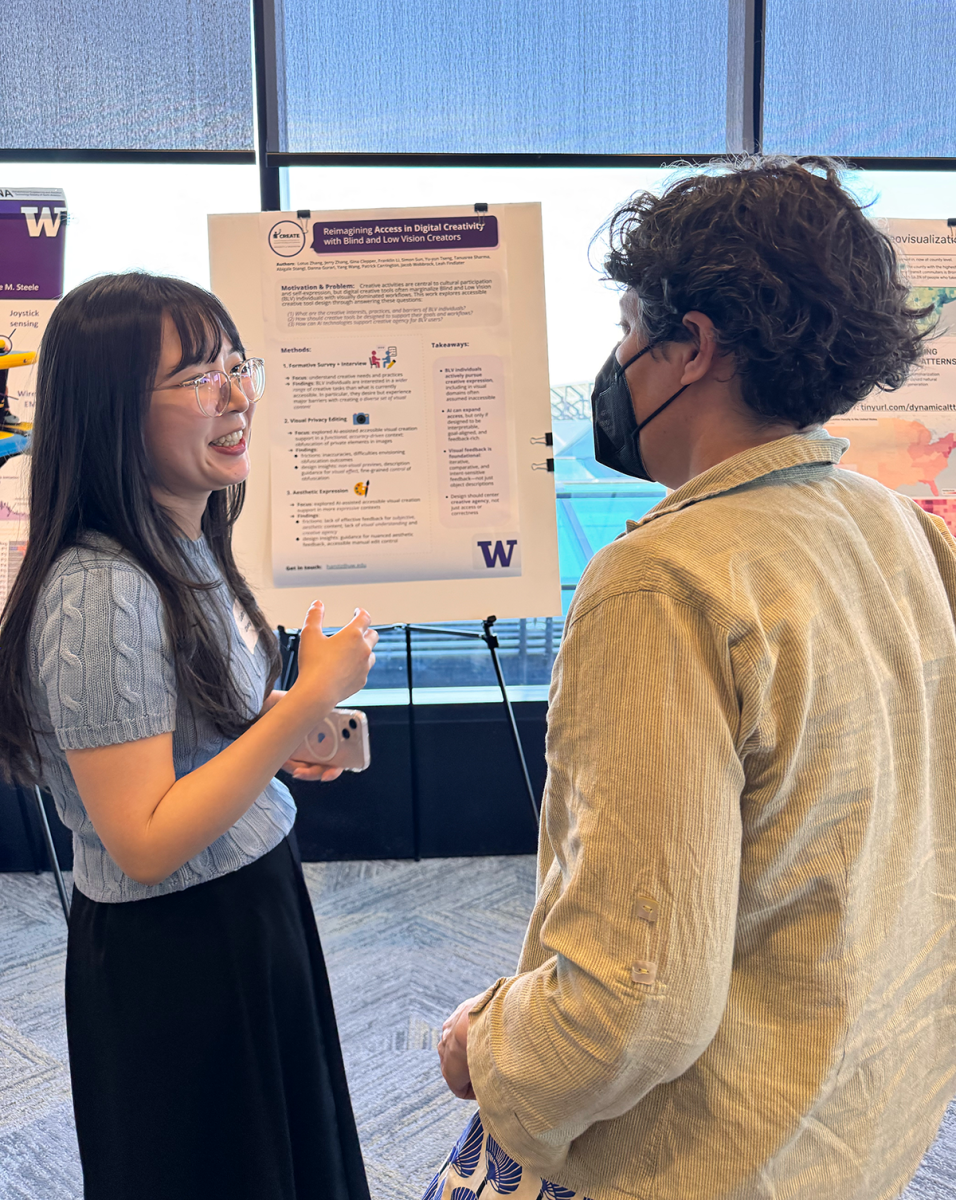
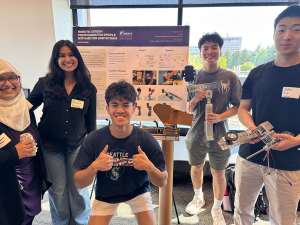
For presenters
Researchers presenting on their work should consult the following menu:
Poster
- An accessible, branded research poster.
- Ideally, start with the UW Accessible poster template.
- Refer to the UW Accessible documents guidelines.
- Submit files as instructed by Kathleen Quin Voss (check your email).
- A printed version of your poster for presenting at the showcase.
- We’ll provide the easel, backer board, and clips.
- Check with your advisor and school/department about assistance with printing research posters
- Large-format printing services are also available on campus for a fee.
Project description
A description for the event web page, including:
- Project title
- 1-3 sentence project description using plain language
- Point of contact
- List of all team members
Optional media
- A link to a short video of your demo or project presentation.
- Web page links
- GitHub links
Presenter
Make sure you will have a representative with your project for the duration of the event (it does not need to be the same person for the whole time).
Email Kathleen Quin Voss, CREATE Community Engagement and Partnerships Manager